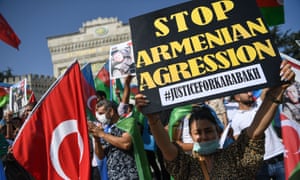At least one person killed in Ganja incident, as former Soviet republics move closer to war

Fighting between Armenia and Azerbaijan over the disputed region of Nagorno-Karabakh has escalated dramatically after Baku accused Armenian forces of firing rockets at Ganja, which lies outside the contested territory.
At least one civilian was killed and four more injured in the attack on Sunday on Ganja, Azerbaijan’s second largest city, 100km (60 miles) north of the Karabakh capital, Stepanakert.
Armenia, meanwhile, said that Stepanakert itself, which has been under shelling since Friday, was hit again on Sunday. There were reports of reports of dead and wounded civilians in both the capital and the historic town of Susha, with Armenia’s foreign ministry accusing Azerbaijani forces of “the deliberate targeting of the civilian population”.
The fighting brings the two former Soviet republics a step closer to outright war after eight days of clashes, and threatens to draw the regional powers Turkey, Russia and Iran into a battle for influence in the sensitive south Caucasus.
In a fiery televised address to the nation, Azerbaijani president Ilham Aliyev set conditions for a halt to the fighting that would be near impossible for Armenia to accept.
He said “Nagorno-Karabakh is our land” and that Armenian forces “must leave our territories, not in words but in deeds”, provide a timetable for a full withdrawal, and recognise the territorial integrity of Azerbaijan.
“This is the end. We showed them who we are. We are chasing them like dogs.”
His aide Hikmet Hajiyev said there had also been civilian casualties in another Azeri region, Beylagan, which borders Nagorno-Karabakh, and that his country would not hesitate to retaliate against Armenian shelling of Azerbaijani population centres.
Late on Sunday, Hajiyev said the industrial city of Mingachevir had been attacked. “Mingachevir hosts water reservoir and key electricity plant. Barbaric expression of desperation,” Hajiyev said on Twitter.
Armenia denied it had directed fire “of any kind” towards Azerbaijan. The Armenian leader of Nagorno-Karabakh, Arayik Harutyunyan, however, confirmed on Facebook that his forces had targeted a military airbase in Ganja, but later stopped firing in order to avoid civilian casualties.
Harutyunyan also warned that it would now consider “military facilities in Azerbaijan’s big cities” as legitimate targets.
“I call on the residents of these cities to immediately leave,” Harutyunyan said in a post on Facebook.
The International Committee of the Red Cross on Sunday condemned the reports of “indiscriminate shelling and other alleged unlawful attacks using explosive weaponry in cities, towns and other populated areas”.
While the conflict has centuries-old roots, a bitter war between Armenian and Azerbaijani forces over Nagorno-Karabakh was triggered by the collapse of the Soviet Union. A ceasefire in 1994 left Armenia in full control of the area and surrounding enclaves, which are internationally recognised as Azerbajiani territory.
The region has long attracted western concern because it is a major oil and gas pipeline corridor to world markets.
Tensions between the two neighbours over the last 30 years have traditionally been mediated by Russia, which has a military alliance with Armenia but also maintains close links with Baku’s ruling elite and sells arms to both sides.
Turkey, which has strong cultural and economic ties to Azerbaijan, is widely viewed to have stoked the fresh hostilities by declaring its staunch support for Azerbaijan when the fighting broke out last week. The Turkish president, Recep Tayyip Erdoğan, declared: “For there to be a solution, the [Armenian] occupiers must withdraw from these lands.”
Ankara and Baku have conducted large-scale joint military drills since clashes in July that killed 17 people in a different border region.
Calls from Russia, the US, France and the EU for a ceasefire have so far been ignored and the violence appears to be worsening. Armenia says that the Karabakh cities of Stepanakert and Martakert have come under attack by Azerbaijani jets and long-range missiles, while Azerbaijan said on Saturday its forces had captured a string of villages. Armenia acknowledged that ethnic Armenian fighters were under pressure in some places and said the situation on the ground was fluctuating.
The fighting has also been characterised by accusations from both sides of foreign involvement in the escalating violence.
The Guardian has reported that 1,000 Syrian fighters working for private Turkish security firms have deployed to Karabakh to support Azerbaijan’s armed forces, which has been denied by both Ankara and Baku.
The bodies of at least 50 Syrian combatants were repatriated to the last rebel-held corner of the country on Saturday, with some funerals held for the dead men the same day, several Syrian families said.
Earlier this week Armenia also accused a Turkish air force F-16 jet of shooting down an Armenian warplane, but did not release any material evidence.
Tahir Taghizadeh, the Azerbaijani ambassdor to the UK, told the Guardianthat Turkey’s support for Azerbaijan was “solely limited to military training and putting diplomatic pressure on Armenia”.
Baku says Yerevan is being aided by fighters from the Kurdistan Workers’ party (PKK) militant group based in Syria and Iraq, but has also not produced any proof.
Iran, which has a sizeble Azeri population and shares borders with both Armenia and Azerbaijan, has denied reports it is providing Armenia with arms and military equipment and has officially called on both countries to deescalate.
Nagorno-Karabakh is now the third theatre in which Moscow and Ankara are engaged in a volatile power struggle, after Syria and Libya. Turkey has facilitated the deployment of up to 16,000 Syrian mercenaries to Libya’s battlefields so far this year.
With Agence France-Presse
